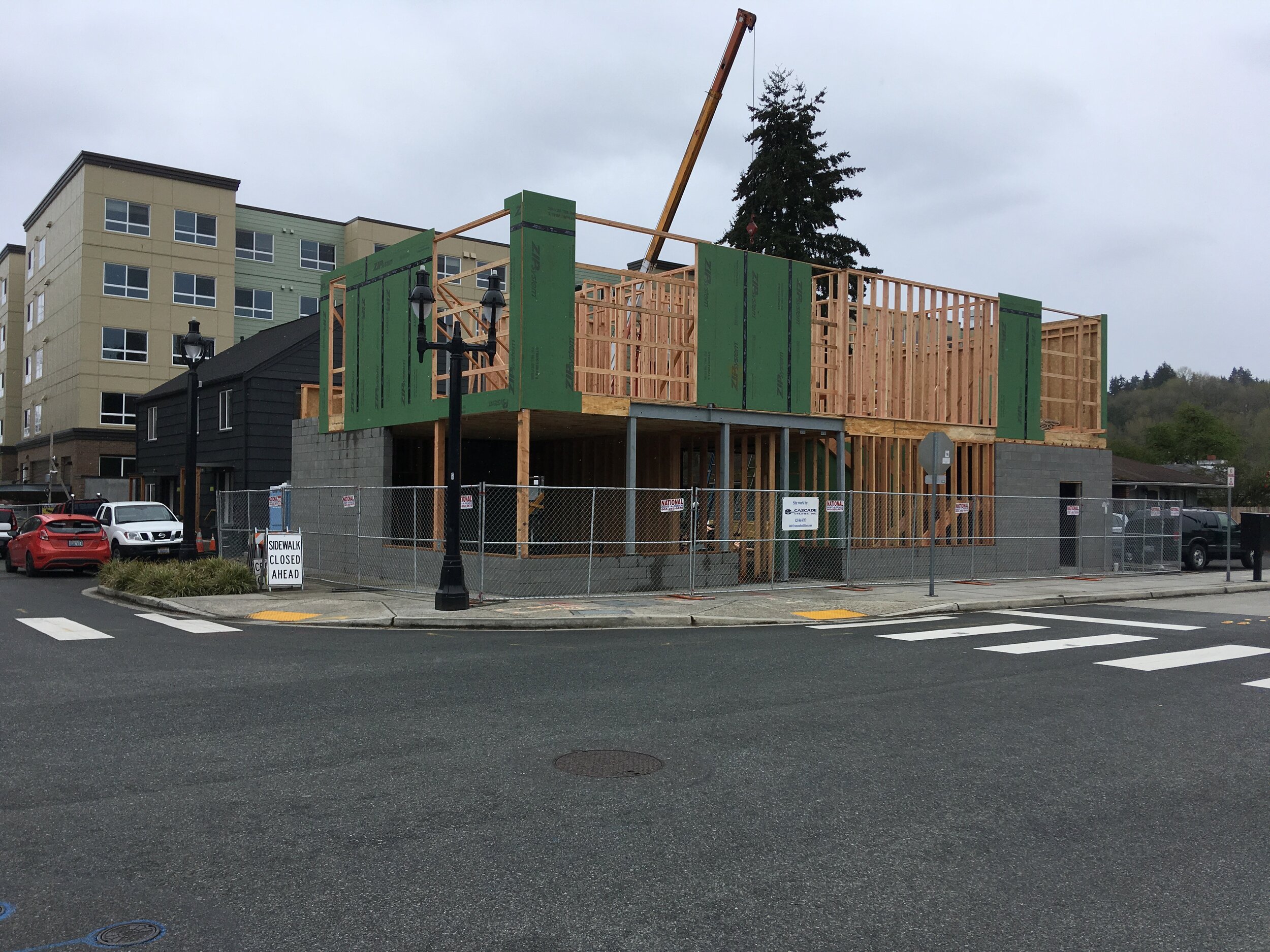Cary Westerbeck’s Fir Street Flats
Washington architect Cary Westerbeck spent most of his life in suburbia, far from anything dense or walkable.
“I didn’t even realize how important walkability was to me until later in life. And it’s funny, because I did embrace that in college. It was awesome to walk to clubs and shows and all the stuff you do when you’re 20,” he laughs. “When I was introduced to the concept of walkability, I was like, ‘Oh, I’ve done that, and I loved it!’”
Newly energized to invest in his neighborhood in the center of Bothell, WA, Cary used a standard 30-year mortgage to buy a .06 acre property in April 2014. He moved his family into the existing building in 2015 and set out to become a developer. But he quickly realized that he had a lot to learn.
“Given my trade, I had the building stuff down already. It was all the other stuff that was a mystery. It seems mysterious to all of us at some point, really,” Cary remembers.
Still, his property remained incomplete, serving as a reminder of a dream Cary still didn’t quite know how to fulfill. But in 2016, Cary found out about IncDev, and everything changed.
“I knew these guys could help me realize the dream and keep moving forward,” Cary says.
Cary had a stockpile of frequent flyer miles, and he used them to get himself to IncDev’s soonest Small Scale Development Workshop, taking place in San Antonio, TX. According to Cary, it was a game changer.
“IncDev starts with the idea that you can do this even if you don’t have deep pockets,” he explains. “There’s a way to do it by working small, working smart, hustling, and putting together deals with other people. And that was a little bit extraordinary because most people think you have to have mom and dad’s money or some amazing career in tech with money to burn. IncDev says, ‘Nope, you can do it, and we’ll show you how.’ No one else is doing that.”
Cary says that his biggest takeaway from the Workshop was the confidence that he could really be a small developer, and he learned a slew of new technical skills, as well.
“I learned things I previously had no clue how to deal with, like how to structure financing and contracts, and the process in general. IncDev demystifies everything really well, and they provide us with clear information to declutter getting a project done,” he says.
Full of new knowledge and inspiration, Cary left the workshop and began diligently chipping away at his planned project: a fourplex with three apartments, ranging from 720sf to 1500sf, and a 560sf commercial space. Over the next two years, Cary spent much of his free time outside of his 40 hours-per-week day job consulting with IncDev co founder R John Anderson and hundreds of other small developers on the We Do Incremental Development Facebook group. With the Facebook group members as a sounding board, Cary fleshed out his project, completed the design and engineering, and spoke with a number of small banks about financing.
“Those two years were spent completing the technical side of the process,” he explains.
By the end of 2018, Cary was ready to begin construction. Wanting to devote all of his time and energy to the project, he decided to take a year off of architecture. With 8 and 14 year-old daughters to provide for, Cary says that his wife was crucial in taking the leap.
“She works full-time as a high school teacher, and she’s really been my rock as my income fluctuates from doing all this,” Cary emphasizes.
Construction was completed on the three story, 5200sf building (known to early Alliance alumni as a 4F, “Form Follows Finance Fourplex”) in December 2019. He and his family continue to live in one unit and rent out the other three. When all was said and done, the project cost $1.6mil, and Cary felt like an official developer.
While he did ultimately start taking clients again as an architect, Cary also works part time as a developer. His current project is a new-build on the same lot as his mixed-use apartment building. In the past years, the area has seen an influx of residents due to large companies like Microsoft, Boeing, Facebook, and Amazon. For this reason, Bothell is seeing large apartment complexes popping up left and right, but Cary is working hard to ensure that his city remains human-scale.
“You see those huge projects, but even if I was doing really well as a developer, I wouldn’t be interested in doing a huge one. Small development is accessible and it builds community,” he says. “A city like ours would be better off if we had more of these medium-sized buildings, but dense and urban.”
Cary says the simplest way that he works to build community is by just sitting out on his front sidewalk and saying hello to passersby. He loves Bothell, and he wants to know as many of his fellow residents as possible.
“The quality of life is great, and all of my family is here. As much as I love to travel the world, I always want to come back and stay in Bothell. It’s a good corner of the world. It’s in my bones, really,” he explains.
Inspired by the many people he’s met through IncDev, Cary is trying to build an army in his own “corner of the world.” Currently, city regulations make it difficult to be a small developer in Bothell, but Cary has formed a coalition called Bothellites for People-Oriented Places (BOPOP) that lobbies to make small development less punitive. The group, made up of about nine core members, attends council meetings to ask for change in the city’s zoning code for missing middle housing, slower traffic, the elimination of parking minimums, and incentives for affordable housing.
“We want to see a paradigm shift that will make the climate better for small developers,” Cary asserts. “BOPOP is aggressively trying to change the culture in this city.”
So, whenever Cary meets a potential local developer, he makes it a point to take them out to coffee and help in whatever way he can.
“Mostly I tell them, ‘You can.’ And then I honestly tell them to go to IncDev’s website and Facebook page and start reading some of the resources there. And I tell them, if they can, to fly to a workshop or bootcamp like I did,” he says. “I offer to help coach them and help them throughout the process.”
Cary has even gotten his daughters involved in his buildings, saying that his youngest, especially, enjoys helping out with the new project.
“I love that they’re learning what exactly goes into getting a building up, from the very first shovel of dirt, so that they know they can do it too someday.”
In Cary’s eyes, anyone can (and everyone should) do small development, and he has devoted himself to being an strong advocate for the incremental development philosophy.
“Someone little like me can jump right in and do it. But unfortunately, I’m an anomaly. Not many people are doing these little fine-grain infill buildings,” Cary says. “I want people to wake up and see that we should be doing more of these.”






